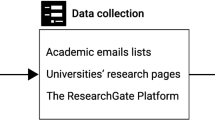Abstract
This paper re-examines the relevance of three academic norms to contemporary academic life – communism, universalism and disinterestedness – based on the work of Robert Merton. The results of a web-based survey elicited responses to a series of value statements and were analysed using the weighted average method and through cross-tabulation. Results indicate strong support for communism as an academic norm defined in relation to sharing research results and teaching materials as opposed to protecting intellectual copyright and withholding access. There is more limited support for universalism based on the belief that academic knowledge should transcend national, political, or religious boundaries. Disinterestedness, defined in terms of personal detachment from truth claims, is the least popular contemporary academic norm. Here, the impact of a performative culture is linked to the need for a large number of academics to align their research interests with funding opportunities. The paper concludes by considering the claims of an alternate set of contemporary academic norms including capitalism, particularism and interestedness.








Similar content being viewed by others
References
Berger, P. L., & Luckmann, T. (1966). The social construction of reality. London: Penguin.
Bok, D. (2003). Universities in the marketplace: The commercialisation of higher education. Princeton: Princeton University Press.
Bourdieu, P. (1989). The corporatism of the universal. The role of intellectuals in the modern world. Telos, 81(Fall), 99–105.
Brew, A. (2001). The nature of research: Inquiry in academic contexts. London: RoutledgeFalmer.
Foucault, M. (1972). The Archaeology of Knowledge. London: Tavistock Publications Translated by A.M. Sheridan Smith.
HESA (Higher Education Statistics Agency) (2007) Staff Data Tables, 2005-06, Retrieved 7, December 2006, from http://www.hesa.ac.uk/dox/dataTables/staff/download/staff0506.xls.
Higher Education Academy (2006). The UK Professional Standards Framework for teaching and supporting learning in higher education. York: HEA/SCOP/Universities UK/HEFCW/ Scottish Funding Council/Department for Employment and Learning.
Lucas, L. (2006). The research game in academic life. Maidenhead: The Society for Research into Higher Education/Open University Press.
Merton, R. K. (1942). The Normative Structure of Science. In N. Storer (Ed.) The sociology of science: Theoretical and empirical investigations (pp. 267–278). Chicago: The University of Chicago Press.
Schwen, M. R. (1993). Exiles from Eden: Religion and the academic vocation in America. Oxford: Oxford University Press.
Skelton, A. M. (2005). Understanding teaching excellence in higher education: Towards a critical approach. London: Routledge.
Weber, M. (1919). Science as a vocation. In E. Shils (Ed. and trans.) (1973) Max Weber on universities: The power of the state and the dignity of the academic calling in Imperial Germany (pp. 54–62). Chicago: The University of Chicago Press.
Author information
Authors and Affiliations
Corresponding author
Rights and permissions
About this article
Cite this article
Macfarlane, B., Cheng, M. Communism, Universalism and Disinterestedness: Re-examining Contemporary Support among Academics for Merton’s Scientific Norms. J Acad Ethics 6, 67–78 (2008). https://doi.org/10.1007/s10805-008-9055-y
Received:
Accepted:
Published:
Issue Date:
DOI: https://doi.org/10.1007/s10805-008-9055-y




